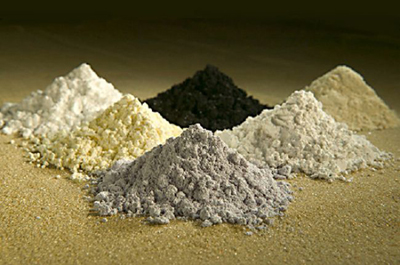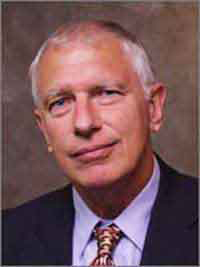China’s Dominance of Crucial Rare Earth Elements and What Comes Next
Doug Casey
 International Man: What are Rare Earth Elements (REEs), and why are they so important? International Man: What are Rare Earth Elements (REEs), and why are they so important?
Doug Casey: The REEs are a group of 17 elements that you may recall from your high school chemistry class. They take up two rows in the periodic table, sitting by themselves at the bottom of the chart. They’re chemically similar to each other.
REEs are widely dispersed on the Earth’s surface. They aren’t “rare” per se, but since they’re not generally concentrated, you only rarely find deposits that are rich enough to qualify as a mine for elements like germanium, gadolinium, ytterbium, yttrium, or 14 others with exotic and obscure names. They’re basically all minor byproducts of mines for other elements—largely aluminum or zinc. They’ve only recently found significant uses with the development of high-tech, especially electronics and magnets. Fifty years ago, they were basically just chemical curiosities.
The US has one pure REE mine, the Mountain Pass, in the California desert near Nevada. In fact, it’s the only one in the Western hemisphere. Now owned by MP Materials (MP: NYSE $25), I have no opinion on the operation. It went bankrupt under its last owner—perhaps it will do better this time around.
International Man: Former Chinese leader Deng Xiaoping once said, “The Middle East has oil. China has rare Earth.”
Today, China dominates the production and processing of REEs.
Why is that?
How likely is it that the US or someone else will be able to break China’s stranglehold soon?
Doug Casey: Deng wasn’t entirely right when he said that. China’s strength in this area isn’t so much in the mining of these things as it is in their processing. Mining any kind of ore is messy and dirty. But processing can be even worse. Smelting takes huge amounts of heat, makes a lot of nasty smoke, and leaves kilotons of toxic waste. Then refining it further takes more of the same, usually plus nasty acids. The Greenies hate mining and refining and try to make them impossible in most places. That’s why so much of it happens in China.
You might say that the immense political and media power of the Greens and eco-warriors is the real reason the West relies on China for REEs.
That’s compounded by the US provoking China with its sanctions, like the recent embargo of chips. So the Chinese, in a tit-for-tat move—which is good game theory, incidentally—decided that they would embargo gallium and germanium. In addition to being important for high-tech and military applications, you need them for wind power, solar power, and electronic vehicles.
It’s quite perverse, actually. The mania for wind, solar, and EVs to save the world from demon oil has resulted in the West shooting itself in the foot by trying to go to so-called renewable power. If the wind, solar, and EV manias went away, we really wouldn’t need a lot of REEs.
It’s especially ironic because giant windmills and giant solar farms are not only highly uneconomic and unreliable but very un-green. These people not only don’t look at the immense mining, refining, and manufacturing costs of making these artifacts but haven’t even started to consider the costs of disposing of them at the end of their useful lives in 10-20 years. The indirect and delayed consequences of the trillion-dollar ideological statements that they’re making are huge.
Can we mine more REEs—as well as millions of tons of nickel, copper, lithium, and other bulk elements needed for an all-electric world—in the US? Absolutely—even though the idea is idiotic. Up until 1980, rare earth elements were produced mainly in the US. It’s only been since 1980 that China has taken over. Meanwhile, the US production has dropped to almost nothing.
The fact of the matter, as has been the case for two generations, is that very few students in the US take degrees in things like geochemistry, geology, and mining engineering. But huge numbers do in China. As a result, there’s going to be even more mining, development, and production in China and a lot less in the US.
International Man: What is your take on the geopolitical significance of China’s rise and the decline of the US?
In other words, could the US ever accept being #2?
Doug Casey: Unfortunately, at this point, the US is only number one in dissipation, wokeism, and consumerism.
When it comes to mining, including the rare earth elements, it typically takes at least ten years from the time you make a discovery to even start production. That’s apart from the fact that discovering an economic deposit in any mineral is unusual. Even after you make this discovery, typically at great expense, it’ll take another ten years to finance it and get regulatory approvals to put it into production. That’s a very risky process because anything could happen in 10 years. It’s actually a fool’s game in today’s world—and I speak as someone who’d been doing it for most of my adult life.
The US has gone downhill radically in regard to producing real goods over the last 40 years, and it’s likely to continue its decline. It’s become a so-called “service” economy. To use an accurate, though politically incorrect, aphorism, the US has transformed itself into a society where we’re all Chinese, taking in each other’s laundry.
It wasn’t so long ago that American wannabe Masters of the Universe liked to say, “We think, they work.” Well, the problem is that most of the things that we think about aren’t productive. In fact, they’re delusional and destructive. It’s no accident that actual production has migrated out of the US, which has become a high-tax, high-regulation environment compared to other places in the world.
China’s got lots of problems, and they could undergo their own collapse as well, albeit for different reasons. But they’ve been doing very well, and I expect that trend will continue.
International Man: In 2010, China abruptly cut off global exports of REEs amid a dispute with Japan. The average price of REEs skyrocketed by over 20 times.
Could something like that happen again?
Doug Casey: Absolutely. China totally dominates this industry.
If the US provokes China by taking actions in the South China Sea or by supporting Taiwan, the Chinese could counter by completely cutting off these elements. That would be very bad for US high-tech industries.
On the other hand, there are plenty of all the rare earth elements in the US, Canada, and the Western Hemisphere. It’s just a question of the economics, politics, and time.
International Man: What are the investment implications of everything we discussed?
How would you speculate on the situation?
Doug Casey: As I said, the problem is quite soluble. I expect that the price of rare earths and other so-called strategic minerals can only go higher at this point. Higher prices are always the solution to shortages. If prices are high enough, that can even overcome regulatory hurdles, one way or another.
How to speculate on the situation? There aren’t futures contracts available on the exotic metals. As a practical matter, you can’t really buy the physicals. You can really only speculate on them by buying the shares of companies that mine them. But which ones?
It’s a very volatile and risky area for lots of different reasons I won’t go into here. Your best bet is probably the shares of Rio Tinto or BHP, which are the world’s largest diversified miners. REEs will never have a meaningful effect on their earnings, but another REE mania may take their share prices higher.
In any event, they have respectable dividend yields and are selling pretty far off their previous highs. Most important, they’re in the right business. It’s a generally crappy business most of the time, but I think things look good for the foreseeable future.
Chinese mining companies? The Chinese will continue to eat the US and Western mining companies’ lunch. The Chinese are, for instance, taking over mining in the Third World. That’s because the long arm of the US government makes it extremely hard for Western companies to deal with the foreign governments who control these deposits. It’s almost impossible to get anything done unless you—dare I use the word—bribe local officials. The Chinese, unlike Americans, aren’t afraid to do that. So US companies will continue to be squeezed out in the search for not just rare earths but almost anything outside of North America.
There are publicly traded mining companies in China, but it’s too risky to invest in them. The US government could as easily sanction them as they did Russian companies.

As the impetus behind the International Man project, Doug Casey is an American-born free market economist, best-selling financial author, and international investor and entrepreneur. He is the founder and chairman of Casey Research, a provider of subscription financial analysis about specific market verticals that he has focused his investing career around, including natural resources/metals/mining, energy, commodities, and technology.
Since 1979, he has written, and later co-written, the monthly metals and mining focused investment newsletter, The International Speculator. He also contributes to other newsletters, including The Casey Report, a geopolitically oriented publication.
Doug Casey is a highly respected author, publisher and professional investor who graduated from Georgetown University in 1968.
Doug literally wrote the book on profiting from periods of economic turmoil: his book, Crisis Investing, spent multiple weeks as #1 on the New York Times bestseller list and became the best-selling financial book of 1980 with 438,640 copies sold; surpassing big-caliber names, like Free to Choose by Milton Friedman, The Real War by Richard Nixon, and Cosmos by Carl Sagan.
Then Doug broke the record with his next book, Strategic Investing, by receiving the largest advance ever paid for a financial book at the time. Interestingly enough, Doug’s book, The International Man, was the most sold book in the history of Rhodesia.
He has been a featured guest on hundreds of radio and TV shows, including David Letterman, Merv Griffin, Charlie Rose, Phil Donahue, Regis Philbin, Maury Povich, NBC News and CNN; and has been the topic of numerous features in periodicals such as Time, Forbes, People, and the Washington Post.
Doug, who divides his time between homes in Aspen, Colorado; Auckland, New Zealand; and Salta, Argentina, has written newsletters and alert services for sophisticated investors for over 28 years. Doug has lived in 10 countries and visited over 175.
In addition to having served as a trustee on the Board of Governors of Washington College and Northwoods University, Doug has been a director and advisor to nine different financial corporations.
Doug is widely respected as one of the preeminent authorities on “rational speculation,” especially in the high-potential natural resource sector.
www.internationalman.com
| ![[Most Recent Quotes from www.kitco.com]](http://www.kitconet.com/images/live/s_gold.gif)
![[Most Recent USD from www.kitco.com]](http://www.weblinks247.com/indexes/idx24_usd_en_2.gif)
![[Most Recent Quotes from www.kitco.com]](http://www.kitconet.com/images/live/s_silv.gif)


